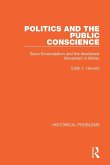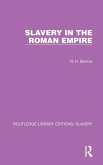Edith F Hurwitz
Politics and the Public Conscience
Slave Emancipation and the Abolitionst Movement in Britain
Edith F Hurwitz
Politics and the Public Conscience
Slave Emancipation and the Abolitionst Movement in Britain
- Gebundenes Buch
- Merkliste
- Auf die Merkliste
- Bewerten Bewerten
- Teilen
- Produkt teilen
- Produkterinnerung
- Produkterinnerung
This book, originally published in 1873, analyses the factors which made the Anti-Slavery Movement so successful. It exposes the roots of its passionate support and explains How the government came to accept the objectives of religious idealists.
Andere Kunden interessierten sich auch für
![The Last Slave Ship The Last Slave Ship]() Ben RainesThe Last Slave Ship15,99 €
Ben RainesThe Last Slave Ship15,99 €![Politics and the Public Conscience Politics and the Public Conscience]() Edith F. HurwitzPolitics and the Public Conscience51,99 €
Edith F. HurwitzPolitics and the Public Conscience51,99 €![The African Link The African Link]() Anthony J BarkerThe African Link154,99 €
Anthony J BarkerThe African Link154,99 €![Respectability as Moral Map and Public Discourse in the Nineteenth Century Respectability as Moral Map and Public Discourse in the Nineteenth Century]() Woodruff D SmithRespectability as Moral Map and Public Discourse in the Nineteenth Century206,99 €
Woodruff D SmithRespectability as Moral Map and Public Discourse in the Nineteenth Century206,99 €![British Honduras British Honduras]() Stephen L CaigerBritish Honduras135,99 €
Stephen L CaigerBritish Honduras135,99 €![Slavery in the Roman Empire Slavery in the Roman Empire]() R H BarrowSlavery in the Roman Empire157,99 €
R H BarrowSlavery in the Roman Empire157,99 €![Transformations in Africana Studies Transformations in Africana Studies]() Transformations in Africana Studies180,99 €
Transformations in Africana Studies180,99 €-
-
-
This book, originally published in 1873, analyses the factors which made the Anti-Slavery Movement so successful. It exposes the roots of its passionate support and explains How the government came to accept the objectives of religious idealists.
Hinweis: Dieser Artikel kann nur an eine deutsche Lieferadresse ausgeliefert werden.
Hinweis: Dieser Artikel kann nur an eine deutsche Lieferadresse ausgeliefert werden.
Produktdetails
- Produktdetails
- Verlag: Taylor & Francis
- Seitenzahl: 180
- Erscheinungstermin: 26. Juli 2021
- Englisch
- Abmessung: 234mm x 156mm x 11mm
- Gewicht: 431g
- ISBN-13: 9781032037981
- ISBN-10: 1032037989
- Artikelnr.: 69949449
- Herstellerkennzeichnung
- Libri GmbH
- Europaallee 1
- 36244 Bad Hersfeld
- gpsr@libri.de
- Verlag: Taylor & Francis
- Seitenzahl: 180
- Erscheinungstermin: 26. Juli 2021
- Englisch
- Abmessung: 234mm x 156mm x 11mm
- Gewicht: 431g
- ISBN-13: 9781032037981
- ISBN-10: 1032037989
- Artikelnr.: 69949449
- Herstellerkennzeichnung
- Libri GmbH
- Europaallee 1
- 36244 Bad Hersfeld
- gpsr@libri.de
Edith F. Hurwitz
Part 1: Introduction 1. Introduction 2. Ideological Trends in Anti-Slavery Thought 3. Politics and the Public Conscience: The Anti-Slavery Movement and the Emancipation Act
1831-40 4. The Anti-Slavery Movement and British Society Part 2: Documents 1. From William Wilberforce An Appeal to the Religion
Justice and Humanity of the inhabitants of the British Empire on behalf of the slaves in the West Indies (London
1823) 2. A brief view of the nature and effects of slavery as it exists in the colonies of Great Britain (London 1823) 3. From Memoirs of Sir Thomas Fowell Buxton
Baronet
with selections from his correspondence
edited by Charles Buxton (American edition
Philadelphia
1849) 4. From Report of the agency committee of the anti-slavery society (London 1832) 5. From Memoir of William Knibb
Missionary of Jamaica
by John Howard Hinton (London
1847) 6. From Substance of an Address to the Ladies of Glasgow and Vicinity on Negro Emancipation - Mr Anderson's Chapel - 5 March 1833
by George Thompson (Glasgow
1833) 7. Petitions for the Abolition of Slavery 8. From the Speech of Edward Stanley
Secretary of State For the Colonies
Introducing the Government Plan for the Emancipation of Slaves
14 May 1833 9. From the Petition of Lords Wellington
St. Vincent
Penshurst and Wynford Against the Emancipation Act
20 August 1833 10. From Abolition of Slavery Act 1833: 3 & 4 William IV
c.73 11. From a Letter of Thomas Clarkson to William Smith
1 September 1833.
1831-40 4. The Anti-Slavery Movement and British Society Part 2: Documents 1. From William Wilberforce An Appeal to the Religion
Justice and Humanity of the inhabitants of the British Empire on behalf of the slaves in the West Indies (London
1823) 2. A brief view of the nature and effects of slavery as it exists in the colonies of Great Britain (London 1823) 3. From Memoirs of Sir Thomas Fowell Buxton
Baronet
with selections from his correspondence
edited by Charles Buxton (American edition
Philadelphia
1849) 4. From Report of the agency committee of the anti-slavery society (London 1832) 5. From Memoir of William Knibb
Missionary of Jamaica
by John Howard Hinton (London
1847) 6. From Substance of an Address to the Ladies of Glasgow and Vicinity on Negro Emancipation - Mr Anderson's Chapel - 5 March 1833
by George Thompson (Glasgow
1833) 7. Petitions for the Abolition of Slavery 8. From the Speech of Edward Stanley
Secretary of State For the Colonies
Introducing the Government Plan for the Emancipation of Slaves
14 May 1833 9. From the Petition of Lords Wellington
St. Vincent
Penshurst and Wynford Against the Emancipation Act
20 August 1833 10. From Abolition of Slavery Act 1833: 3 & 4 William IV
c.73 11. From a Letter of Thomas Clarkson to William Smith
1 September 1833.
Part 1: Introduction 1. Introduction 2. Ideological Trends in Anti-Slavery Thought 3. Politics and the Public Conscience: The Anti-Slavery Movement and the Emancipation Act
1831-40 4. The Anti-Slavery Movement and British Society Part 2: Documents 1. From William Wilberforce An Appeal to the Religion
Justice and Humanity of the inhabitants of the British Empire on behalf of the slaves in the West Indies (London
1823) 2. A brief view of the nature and effects of slavery as it exists in the colonies of Great Britain (London 1823) 3. From Memoirs of Sir Thomas Fowell Buxton
Baronet
with selections from his correspondence
edited by Charles Buxton (American edition
Philadelphia
1849) 4. From Report of the agency committee of the anti-slavery society (London 1832) 5. From Memoir of William Knibb
Missionary of Jamaica
by John Howard Hinton (London
1847) 6. From Substance of an Address to the Ladies of Glasgow and Vicinity on Negro Emancipation - Mr Anderson's Chapel - 5 March 1833
by George Thompson (Glasgow
1833) 7. Petitions for the Abolition of Slavery 8. From the Speech of Edward Stanley
Secretary of State For the Colonies
Introducing the Government Plan for the Emancipation of Slaves
14 May 1833 9. From the Petition of Lords Wellington
St. Vincent
Penshurst and Wynford Against the Emancipation Act
20 August 1833 10. From Abolition of Slavery Act 1833: 3 & 4 William IV
c.73 11. From a Letter of Thomas Clarkson to William Smith
1 September 1833.
1831-40 4. The Anti-Slavery Movement and British Society Part 2: Documents 1. From William Wilberforce An Appeal to the Religion
Justice and Humanity of the inhabitants of the British Empire on behalf of the slaves in the West Indies (London
1823) 2. A brief view of the nature and effects of slavery as it exists in the colonies of Great Britain (London 1823) 3. From Memoirs of Sir Thomas Fowell Buxton
Baronet
with selections from his correspondence
edited by Charles Buxton (American edition
Philadelphia
1849) 4. From Report of the agency committee of the anti-slavery society (London 1832) 5. From Memoir of William Knibb
Missionary of Jamaica
by John Howard Hinton (London
1847) 6. From Substance of an Address to the Ladies of Glasgow and Vicinity on Negro Emancipation - Mr Anderson's Chapel - 5 March 1833
by George Thompson (Glasgow
1833) 7. Petitions for the Abolition of Slavery 8. From the Speech of Edward Stanley
Secretary of State For the Colonies
Introducing the Government Plan for the Emancipation of Slaves
14 May 1833 9. From the Petition of Lords Wellington
St. Vincent
Penshurst and Wynford Against the Emancipation Act
20 August 1833 10. From Abolition of Slavery Act 1833: 3 & 4 William IV
c.73 11. From a Letter of Thomas Clarkson to William Smith
1 September 1833.








